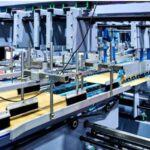Before understanding the role CNC machines play in fabrication, let us understand the depth of the industries involved. Aerospace, Medical, Electronics, Industrial Automation, etc are a few of the industries aggressively working on delivering everything with right tolerances and precision. In fact, in modern day manufacturing, producing parts with intricate details and high precision has become a global competitive need.
Computer Numerical Control is the most advanced form of technology available today. It is the backbone of precision machining services in China and is the main focus of this article. Other topics to be discussed are advantages of CNC Milling, why companies should adapt it to further boost their performance, scalability and CNC Milling’s role in Fabrication.
What Is CMC Milling and How It Works
what is cnc milling referred to as Computer Numerical Control milling is a subtractive manufacturing procedure that uses rotary cutting tools to remove a portion of solid work piece. The work piece is pre shaped into blank form and is put into the x y positioning table of a multi axis machine tool. The movement of the work piece is controlled by precision mechanically driven multi axis machinery, which results in movement that is guided by pre written code and leads to unmatched accuracy in part shaping and fabrication.
Everything starts with a digital design which is developed from CAD software. Each design is subsequently turned into G-code which controls the milling machine. Depending on the skill level of the part, CNC milling machines can operate in 3, 4, or even 5 axes simultaneously to allow for intricate geometric and multi surface carving without the need for repositioning.
One of the most adaptable modern manufacturing technologies is CNC milling. It can work with a wide variety of materials, from plastic, stainless steel to aluminum alloys.
Why CNC Milling is Important for Fabricating Complex Parts
CNC excels at creating multi shaped parts that are very distinct vertically, horizontally, and, developing 3D space features with extremely tight tolerances, intricate features, and premium-grade polish on surface parts. This is why this process is a must for high-precision industries.
Accuracy and Repeatability
Industries like medical technology or aerospace, critical components are manufactured with tolerances as tight as ±0.001mm, using advanced CNC milling machines. After a program is loaded on the machine, it performs all the steps needed mechanically, repetitively and precisely, guaranteeing that all processes done on each element are exactly the same for each production run, which makes sure that the consistency is maintained from part to part.
Efficiency in Complex Geometry
Unlike manual machining, CNC milling gives CNC milling the ability to cut intricate internal and external shapes with ease. Multi-axis capabilities enable the machine to cut curves, angles, and even recesses that may require multiple setups or are impossible to achieve otherwise.
Scalability for Prototyping and Production
One of the strengths of CNC milling is the ability to scale from single unit prototypes to high volume production. Businesses can seamlessly shift from design validation to parts intended for market without processes or suppliers having to be changed.
Material Versatility
From hardened steel to heat resistant alloys and engineering plastics, the requirements of a vast range of materials are met through CNC milling. This flexibility makes it suitable for the diverse B2B sectors where different material properties are required for functional or environmental reasons.
CNC Milling in the Context of China Precision Machining
The phrase China precision machining is often misassociated with low quality manufacturing and high costs but is in fact representative of the CNC industry, China is well known for Quality and affordable services. In the last two decades, China is reported to spend extensively on CNC technologies, skilled labor, and elaborate quality control systems making it a worldwide hub for precision parts fabrication.
Many B2B buyers, particularly those from the industrial and OEM sectors, are now considering China precision machining not just for the competitive pricing, but also for the rapid and accurate fulfillment of complex part requirements. Be it CNC-milled aluminum components for automation systems, or complex medical device housings, China is home to leading machinery companies that take pride in precision and accuracy.
For any global sourcing business or one considering what CNC milling is, familiarity with China’s advanced CNC systems infrastructure is crucial alongside having an understanding of the country’s advancements in global sourcing.
Major Applications In B2B Sectors
In comparison to the other B2B sectors, the requirements met by CNC milling technology are far greater:
Aerospace and Defense
High precision aerospace grade materials are frequently encountered in demanding CNC machining. Parts like brackets, turbine components, and sensor enclosures require CNC milling, as they feature complex geometries, are lightweight, refractory, and stress demanding high performance.
Medical and Healthcare
CNC precision machining is a necessity for implantable surgical devices. Components such as orthopedic implants or surgical tools are prepared using CNC milling, although they are bound by strict standards and regulations.
Automotive and Electric Vehicles (EV)
The demand for precision components has increased with the emergence of EVs and smart vehicles. STEM representatives in the automotive industry consider these innovations and performance milestones for modern automotive engineering: CNC-milled parts such as transmission systems, suspension components, battery enclosures, and many more.
Electronics and Semiconductors
The electronics industry also benefits from using CNC milling technology for producing complex and detailed shapes like casings, connectors, and heat sinks. Increase in power and size of devices comes with a higher requirement for accuracy of components, which exponentially magnifies the precision needed on milled parts.
Industrial Automation
Custom machined parts specialized for use in robotics and control assemblies for conveyor systems are the heart of automation. With CNC milling, there is speed and accuracy in regards to the number of revisions and tolerances that are required for dependable performance of the machines.
How to choose the right CNC milling partner
The right partner to outsource CNC milling could make a huge difference in your project’s success. This is what B2B businesses should pay attention to:
Technical expertise
Focus on their history and if they knew how to deal with multiple materials, multi-stage operations, precision machining, and tight specifications. It solves a multitude of problems that come along the way. The other, less anticipated, issues can be dealt with innovative engineering using experience.
Equipment Capabilities
Suppliers with cleanroom machining, automated inspection machinery, and multi-axis CNC machine priorities are what to look for. Their facilities signal focus on modern quality and streamlines operational cost indicators.
Compliance and Certification
Your partner should comply with international quality standards like ISO 9001 or equivalent. This assures a specified degree of control over processes and assurance of quality in every order.
Communication Without Barriers
Business relations in B2B stem from professionalism and communication. Pay attention to the vendors that are proactive in communications, offer technical consultations, and provide detailed documents, inspection reports, and material certifications.
Production Volume Adaptability
Custom orders and specialized services at advanced CNC milling services includes rapid prototyping and full-run production with no minimum volume requirements.
The Development of CNC Precision Machining and Global Precision Engineering
Looking ahead, the merger of 4th industrial revolution technologies will expand the frontier of CNC milling. The productivity and accuracy improvements brought by the automation of processes and AI toolpath optimization, and digital twins innovations will make it easier for businesses to gain an edge in high-precision engineering.
At the same time, global B2B companies will benefit from increased integration, advanced intelligent supply chains, optimized lead times, and the infrastructure for CNC milling already developed in the China precision machining market.
Conclusion
CNC milling is more than just a tool; it is a defining feature of today’s exacting methods in industrial machining. It is the forefront of numerous industrial applications, from quadrilateral prototypes to the seamless delivery of thousands of identical pieces. For B2B businesses looking for high-volume, cost-effective, and precision manufacturing options, knowing what CNC milling is and its connection with precision machining and China’s manufacturing industry is crucial.
Businesses would be able to leverage CNC milling techniques to redefine innovation and confidently bring products to market, provided they partner with the right organization and have a solid understanding of the processes involved.








